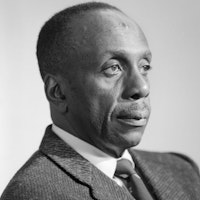This is the basis of hope in moments of despair… the source of confidence when worlds crash and dreams whiten into ash… Look well to the growing edge!
Howard Thurman

The Basis of Hope
Topic: Overcoming Adversity
All around us worlds are dying and new worlds are being born; all around us life is dying and life is being born. The fruit ripens on the tree, the roots are silently at work in the darkness of the earth against a time when there shall be new leaves, fresh blossoms, green fruit. Such is the growing edge!
It is the extra breath from the exhausted lung, the one more thing to try when all else has failed, the upward reach of life when weariness closes in upon all endeavor. This is the basis of hope in moments of despair, the incentive to carry on when times are out of joint and men have lost their reason, the source of confidence when worlds crash and dreams whiten into ash. The birth of a child—life’s most dramatic answer to death—this is the growing edge incarnate.
Look well to the growing edge!
Howard Thurman, born on November 18, 1899, in Daytona Beach, Florida, emerged as a highly influential figure in American history. As a theologian, philosopher, educator, and civil rights leader, Thurman’s intellectual pursuits underscored the intersection of spirituality and the fight for social justice. Growing up in a segregated society, he became a beacon of enlightenment and understanding, using religion and spirituality as powerful tools to combat racial discrimination and social injustice. His profound impact on American society is evident through his extensive writings and teachings, which continue to inspire.
Thurman’s influence extended notably to Dr. Martin Luther King Jr., whom he mentored. His book, Jesus and the Disinherited, profoundly shaped King’s understanding of nonviolent resistance, which became a cornerstone of the Civil Rights Movement. In addition to his role as a mentor, Thurman achieved a historic milestone by becoming the first African-American dean of a predominantly white university, serving as the dean of Marsh Chapel at Boston University. His guidance and teachings helped foster a deeper understanding of the potential role of Christian churches in social justice efforts, which significantly influenced the direction and spirit of the Civil Rights Movement.
Even after King left Boston University, Thurman continued to support him and other civil rights leaders, emphasizing the importance of maintaining spiritual roots amidst their social justice efforts. He urged them to remain vigilant in their spiritual journeys through meditation, prayer, singing, celebration, and worship. Thurman believed that true social change could only come through personal transformation and adherence to spiritual disciplines. Howard Thurman passed away on April 10, 1981, in Daytona Beach, Florida, leaving behind a substantial and impactful legacy that continues to inspire individuals in the fields of civil rights, theology, and education.
The Growing Edge
Thurman, Howard. The Growing Edge. Harper, 1956. [From Howard Thurman's sermon: "The Growing Edge." From a compilation of Thurman's sermons titled The Growing Edge.]

Howard Thurman
Theme: Adversity

About This Howard Thurman Quotation [Commentary]
Howard Thurman’s quote, “This is the basis of hope in moments of despair… the source of confidence when worlds crash and dreams whiten into ash… Look well to the growing edge!” captures the essence of resilience and hope amid adversity. Thurman speaks to the inevitability of challenges and the cyclical nature of life, emphasizing that even when everything seems to be falling apart, there is always a new beginning on the horizon. The “growing edge” symbolizes this perpetual renewal, encouraging us to find strength and confidence even when our circumstances appear bleak.
Thurman illustrates the “growing edge” by highlighting how life continuously cycles through phases of death and rebirth. He draws a vivid picture of nature’s resilience—the fruit ripening on the tree, the roots working silently underground. This metaphor extends to human experience, where even in our most exhausted moments, there is an inner drive that propels us forward. Thurman points out that this drive, this “extra breath from the exhausted lung,” is what sustains us through our darkest times, providing hope and confidence as we face life’s inevitable downturns.
Thurman’s message is particularly poignant when reflecting on adversity. He acknowledges that there will be times when dreams are shattered and worlds seem to crumble. However, he urges us to “look well to the growing edge,” to focus on the potential for new beginnings that arise from these moments of despair. This perspective encourages a shift from a mindset of defeat to one of resilience, where each setback is seen as an opportunity for growth and renewal. This sentiment is echoed by Martin Luther King Jr., who found inspiration in Thurman’s vision during the Montgomery bus boycott, Parker Palmer, who described the growing edge as a space of resilience, and Richard Rohr, who saw it as a place of radical openness and truth (Palmer 2018; Rohr 2018; “Howard Thurman: The Overlooked Civil Rights Hero,” 2019). Thurman’s wisdom reminds us that the cycles of life, both in nature and within ourselves, are filled with the promise of regeneration and the potential for new life even amidst destruction.
Howard Thurman’s Sermons [Commentary on “The Growing Edge”]
In The Growing Edge, Howard Thurman’s sermons reveal his belief that preaching is an act of worship, where the preacher exposes their spirit to reveal the presence of the Living God. Thurman emphasizes continual growth and transformation, urging individuals to embrace their own growing edges for personal and societal betterment. This work inspires a spirit of renewal and hope, encouraging a deeper connection with the divine.
Additional Howard Thurman Quotes
Resources
Related Quotes
Copyright © 2017 – 2026 LuminaryQuotes.com About Us